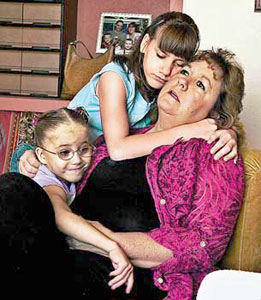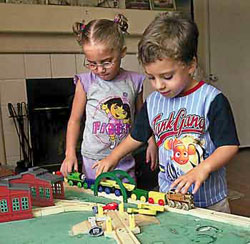 Angela Swink's cocoa-brown eyes blaze with determination as she clutches a toy train engine, refusing to relinquish it to her 3-year-old brother, Cody.
Angela Swink's cocoa-brown eyes blaze with determination as she clutches a toy train engine, refusing to relinquish it to her 3-year-old brother, Cody.Prenatal alcohol exposure: Going to bat for special children
Free meeting will help families cope
Tucson
Citizen Friday, July 15, 2005
GABRIELLE FIMBRES
gfimbres@tucsoncitizen.com
 Angela Swink's cocoa-brown eyes blaze with determination as she clutches a toy train engine, refusing to relinquish it to her 3-year-old brother, Cody.
Angela Swink's cocoa-brown eyes blaze with determination as she clutches a toy train engine, refusing to relinquish it to her 3-year-old brother, Cody.
"You're going to make me share and I'm going to throw a hissy fit," the petite 11-year-old Tucson girl tells her mother, Dawn Swink.
"That's the fetal alcohol attitude," the Tucson mom explains before warning her daughter that a hissy fit will land her in a timeout.
Dawn Swink is the adoptive mother of four children who were damaged by alcohol in the womb. She spends her days going to bat for her children, helping them get the services they need, giving them the greatest chance of success.
She has not done it alone. For the past several years, Swink has turned to Teresa Kellerman and the Fetal Alcohol Syndrome Community Resource Center in Tucson.
"There are days I just need someone to talk to," Swink says.
Families such as the Swinks, who are parenting children damaged prenatally by alcohol, will come together tomorrow for information and support at "Sharing Stories ... Finding Hope," offered through the resource center and the Arc of Arizona Prevention Committee.
The forum will offer information on Fetal Alcohol Spectrum Disorders, as well as resources and intervention strategies.
The center estimates that more than 11,000 babies are born in Arizona each year to women who engaged in binge drinking during pregnancy.
Drinking in pregnancy is the leading known cause of mental retardation in children, Kellerman said. It is believed that as many as 90 percent of children in foster care were exposed to alcohol in the womb, Kellerman added.
Prenatal exposure to alcohol causes more brain damage than any other drug, including crack cocaine and heroin. Children exposed to alcohol can suffer from learning disabilities, mental health issues, poor impulse control and mood disorders. And the problems don't disappear in adulthood.
"Without intervention they end up homeless, jobless, addicted, arrested, pregnant or getting someone pregnant, living on the streets or dead, so many of them," said Kellerman, whose adopted son, John, 27, has fetal alcohol syndrome.
Hearing the stories of families at the forum will be Helena Kalmis, executive director of the Pima Council on Developmental Disabilities. She will report families' concerns to the Governor's Council on Developmental Disabilities, Kellerman said.
As with many adoptive families, the Swinks were not prepared for FAS.
"I knew nothing about fetal alcohol syndrome," said Swink, a University of Arizona student who adopted six special needs children after giving birth to two.
But with help from Kellerman and the resource center, Swink has become an advocate for her children. Still at home with her are Richard, 13; Angela; Kimberly, 5; and Cody.
Angela was the most damaged by alcohol in the womb, and has fetal alcohol syndrome.
Her face bears the telltale signs of the syndrome, with wide-set eyes and other abnormalities. She is small for her age, and her head is the size of an 18-month-old's.
Angela has learning disabilities and is hyperactive. She can be consumed by fits of rage, sometimes set off by noise or even fluorescent lights.
Richard, Kimberly and Cody, who have the same birth mother, were exposed to alcohol in the womb. The three are developmentally delayed.
Swink said there are hidden disabilities. "If you saw these kids on the street, you wouldn't know there were fetal alcohol issues," she said.
She said a teacher once told her, "Angela's too cute to need special ed."
The children fill the Swink home on the far Southwest Side with laughter and occasional arguments. Cody trounces through the house in his Spider-Man sneakers.
 "He's a doll," Swink said. "He's the sweetest boy, ever so happy."
"He's a doll," Swink said. "He's the sweetest boy, ever so happy."
Wearing her favorite "Dora the Explorer" shirt, Kimberly looks at the pages of a picture book. There are dozens of hugs and kisses for their mom.
But the road ahead of the family is long.
Angela will be in a self-contained special ed classroom this fall with a teacher and two aides. She uses a special computer to help her write.
"Children pick on her at school because they don't understand her disability," Swink said. "She comes home crying a lot."
Dealing with peer rejection is one of the many challenges families face, said Kellerman, who heads the resource center. Finding support is the key to success, she said.
"The families that are active in a parent support group are more likely to be successful," said Kellerman, who adopted her son at birth. John works at Desert Survivors Native Plant Nursery and lives in a supervised home with his sister.
Kellerman said when she adopted John, she knew nothing about FAS.
"There was no support group, no Internet, no books out." So she started the center here.
Today, the center helps hundreds of families and professionals seeking information. And her Web site, www.fasarizona.com, receives at least 50,000 hits each month, she said.
Kellerman pays for most expenses out of her pocket. The state provides an office and meeting space and telephone, but she has no salary or money for materials.
She said families support one another through the center.
"Parents realize they are not crazy, and it's not all their fault," she said.
After raising their two children, Sue and Armando Argumedo adopted two girls. Haylee 11, has FAS, and Georgina, 7, was exposed to alcohol in the womb.
"Social isolation for families becomes a real issue," said Sue Argumedo, 56. "People think you don't know how to discipline your child."
She said the family struggles with cruelty endured by Haylee from her peers.
But they have found a haven at the resource center. Kellerman has armed the family with information to help them get services the girls need. While both girls face challenges, their parents believe they can achieve their dreams.
Information: www.fasarizona.com and www.fasstar.com.